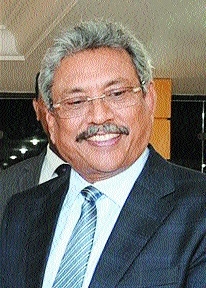Rajapaksa declares emergency amidst protests in Lanka
| Date :03-Apr-2022 |

COLOMBO :
SRI LANKAN President Gotabaya Rajapaksa has declared a nationwide public emergency amidst a spate of protests, including outside his house, over the worst economic crisis in the island nation. Rajapaksa issued a special gazette notification late on Friday night, declaring a public emergency in Sri Lanka with immediate effect from April 1. In the gazette, the President states: “Whereas I am of opinion that by reason of a public emergency in Sri Lanka it is expedient to do so in the interests of public security the protection of public order and the maintenance of supplies and services essential to the life of the community”. The move also came as the island nation braced for country-wide protests against the Government’s poor handling of the ongoing economic crisis where people currently endure long hours of power outages and scarcity of essentials.
Commenting on the emergency, independent think-tank Center for Policy Alternatives said that “regulations may impose restrictions on certain fundamental rights guaranteed by the constitution” one of them would be among others: the rights to freedom of expression, assembly, association, movement, occupation, religion, culture and language. Lawyers commented that the regulations gave the police sweeping powers to arrest anyone for unlawful assembly. The regulations must be approved in Parliament every 30 days from their imposition. The declaration came at the same time as the court ordered bail to a section of the protesters arrested for the demonstration opposite Rajapaksa’s residence on Thursday. Lawyer Nuwan Bopage, who was among around 500 lawyers gathered at Colombo suburban Gangodawila magistrate’s court to give free counsel, said, out of 54 arrested, as many as 21 were given bail. Six were remanded until April 4. The rest of the 27 are in hospitals with severe assault injuries.
“This was a very significant ruling. The court asked the police to file evidence of each of their involvement in acts of violence. They could not do so,” Bopage said. The Government blamed the Rajapaksa residence incidents on an extreme group connected to the Opposition political parties. The protesters said that participants had no political motivation and were only looking for solutions from the Government for the hardships heaped on the public. Several people were injured and vehicles were set on fire as the agitation turned violent. Police fired tear gas and water cannons at the protesters after they pulled down a steel barricade placed near the president’s residence. Several people were arrested and a curfew briefly imposed in most parts of Colombo city.